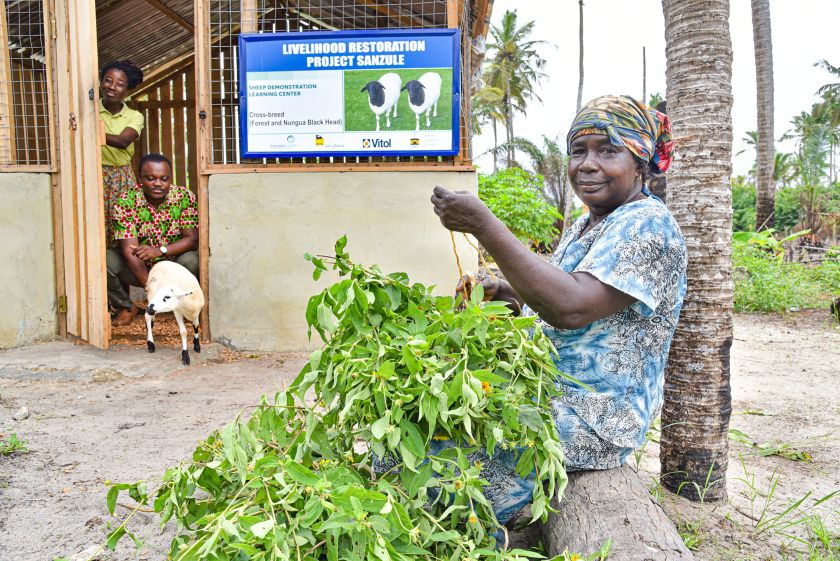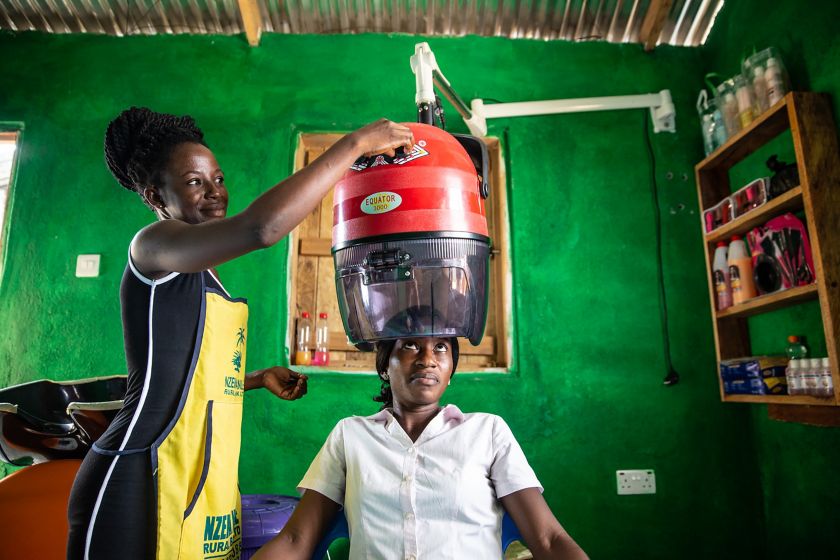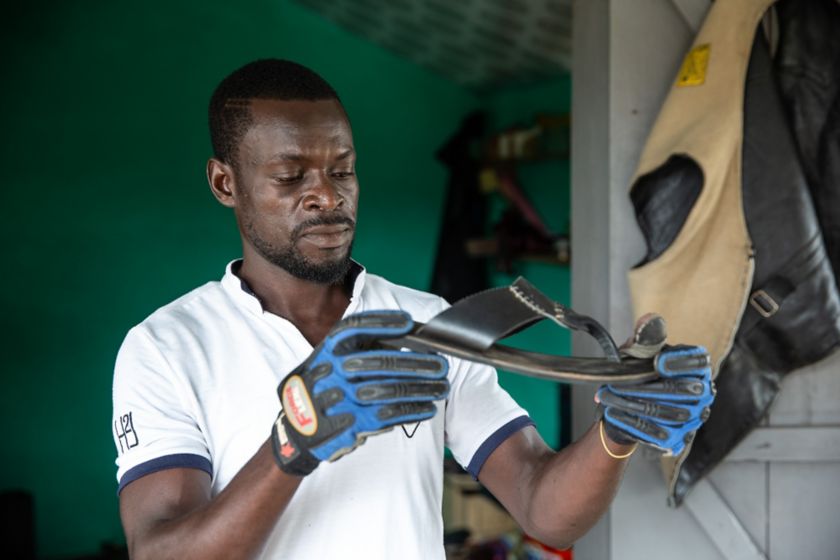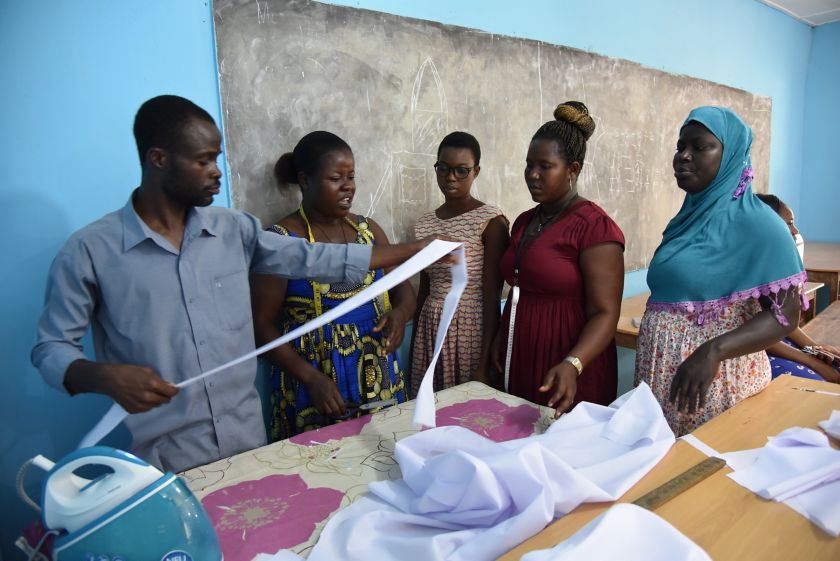Type of activity
Access to energy
Territory protection
Economic diversification

Or , our new artificial intelligence tool.

In Ghana, we are engaged in the exploration sector, in the production of oil and gas, in refining, and in the chemical industry. Under the Livelihood Restoration Plan (LRP), we have encouraged the diversification of small businesses run by locals in the Western Region. National gas resources in Ghana are a great opportunity to improve access to energy and contribute to the country's economic development. In order for the new activities related to the production of oil and natural gas to generate concrete benefits also for the local communities hosting them, it is important to create the conditions for them to be integrated in the local context and to contribute to creating new opportunities for the people living there. Following the acquisition of land for the onshore natural gas reception facilities for the Offshore Cape Three Points (OCTP) project, we initiated the LRP to address the socioeconomic shifts caused by building the facility in the region. The project has amplified and shared the benefits of the project to local communities through the launch of small business ventures, offering chances for income and growth.
Ghana
2016 - 2024
The Livelihood Restoration Plan project aimed to restore and strengthen the livelihood conditions of communities in Sanzule and others in neighbouring areas in the Western Region, which are affected by the Offshore Cape Three Points (OCTP) project and the onshore gas reception facilities from the Sankofa field. During the transition phase, we supplied food aid to families, then moved on to launching sustainable enterprises and a financial education programme, aiming to ensure they managed their compensation from the land acquisition effectively. We have particularly focused on the start of farming, animal husbandry, fish farming, small commercial businesses, and market access. In partnership with the non-governmental organisation Technoserve, we have worked closely with communities, offering training in business management and guidance from skilled technicians. After the compensation phase ended, we assessed the LRP's success using the MPI (Multidimensional Poverty Index) method, which showed that 14 families remained in multidimensional poverty. Eni Ghana continues to support these families to help them escape poverty.

Project beneficiaries

A project beneficiary in her hair salon

Project beneficiary in his leather workshop

African community during a sewing class
invested in the project
benefiting from the LRP
involved in the project
who have chosen to develop aquaculture
Read the stories, case studies and testimonials behind our contribution to a socially equitable energy transition in the Sustainability Report.
The interactive specialWe have done a range of work in Ghana, fostering socio-economic development for the community of Sanzule. In the video you can hear from people whose lives have been improved in a sustainable way, thanks to the Livelihood Restoration Plan project.
06 May 2020
We have done a range of work in Ghana, fostering socio-economic development for the community of Sanzule. In the video you can hear from people whose lives have been improved in a sustainable way, thanks to the Livelihood Restoration Plan project.
16 October 2023
We have done a range of work in Ghana, fostering socio-economic development for the community of Sanzule. In the video you can hear from people whose lives have been improved in a sustainable way, thanks to the Livelihood Restoration Plan project.
16 October 2023

If you want to change topic, clear the chat and make a new query to receive more relevant results.
This will delete the question history.
If you want to change topic, clear the chat and make a new query to receive more relevant results. This will delete the question history.
Here you can find the full list of your queries.
The answers are generated by artificial intelligence, therefore they may contain inaccuracies. Please read the terms and conditions of use.

EnergIA is an innovative tool based on artificial intelligence capabilities, which can help you navigate the contents of eni.com, quickly finding answers to your questions. EnergIA can also perform a search on a specific topic, providing the most up-to-date data available, or it can invite you to delve deeper into a topic of your interest by suggesting links and specific readings. Start now!
EnergIA is an innovative tool based on artificial intelligence capabilities, which can help you navigate the contents of eni.com, quickly finding answers to your questions. Start now!
EnergIA (ener'dʒia) is a system based on Generative Artificial Intelligence.
Thanks to this technology, we can respond to your requests by querying the most relevant content and documents available on eni.com. (Note: financial documents from the last 12 months and press releases from the last 2 years are considered.)
Through EnergIA, you can delve into topics of interest and have a real-time window into the world of Eni.
If you wish to search for a specific document, press release or news, use the traditional search engine via the magnifying glass icon.
Like all systems that leverage Generative Artificial Intelligence, EnergIA may generate inaccurate or outdated responses. Always consult the sources that EnergIA proposes as the origin of the generated information.
If the system fails to find an exact match for the requested content, it still tends to provide a response.
If you find any inaccuracies in the provided response, please send us your feedback at the bottom of the page: it will be very helpful for us to improve.
Remember that the content generated by the system does not represent Eni’s official position. We therefore invite stakeholders to refer to their designated contacts for official statements: Press Office for journalists, Investor Relations for analysts and investors, Company Secretariat for shareholders etc..
EnergIA can understand questions posed in almost all languages, but we prefer to provide you with a response in English or Italian, the two languages available on eni.com. If you ask a question in Italian, the content on the site in Italian will be consulted. If you ask it in English or any other language, the content in English will be consulted. (Note: the language Eni uses for financial documents/content is predominantly English.)
If questions are formulated that violate the set security criteria, the system will not proceed with processing the response. Please remember not to send personal data.
By using this service, the users acknowledge that they have read and accepted the terms and conditions of use.
Search
EnergIA (ener'dʒia) is a system based on Generative Artificial Intelligence.
Thanks to this technology, we can respond to your requests by querying the most relevant content and documents available on eni.com. (Note: financial documents from the last 12 months and press releases from the last 2 years are considered.)
Through EnergIA, you can delve into topics of interest and have a real-time window into the world of Eni.
If you wish to search for a specific document, press release or news, use the traditional search engine via the magnifying glass icon.
Like all systems that leverage Generative Artificial Intelligence, EnergIA may generate inaccurate or outdated responses. Always consult the sources that EnergIA proposes as the origin of the generated information.
If the system fails to find an exact match for the requested content, it still tends to provide a response.
If you find any inaccuracies in the provided response, please send us your feedback at the bottom of the page: it will be very helpful for us to improve.
Remember that the content generated by the system does not represent Eni’s official position. We therefore invite stakeholders to refer to their designated contacts for official statements: Press Office for journalists, Investor Relations for analysts and investors, Company Secretariat for shareholders etc..
EnergIA can understand questions posed in almost all languages, but we prefer to provide you with a response in English or Italian, the two languages available on eni.com. If you ask a question in Italian, the content on the site in Italian will be consulted. If you ask it in English or any other language, the content in English will be consulted. (Note: the language Eni uses for financial documents/content is predominantly English.)
If questions are formulated that violate the set security criteria, the system will not proceed with processing the response. Please remember not to send personal data.
By using this service, the users acknowledge that they have read and accepted the terms and conditions of use.
A new window into Eni’s world, at your disposal. EnergIA is an innovative tool based on artificial intelligence capabilities, which can help you navigate the contents of eni.com, quickly finding answers to your questions.


